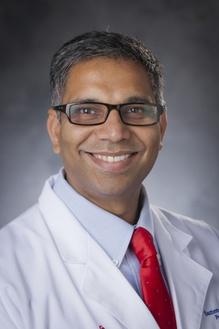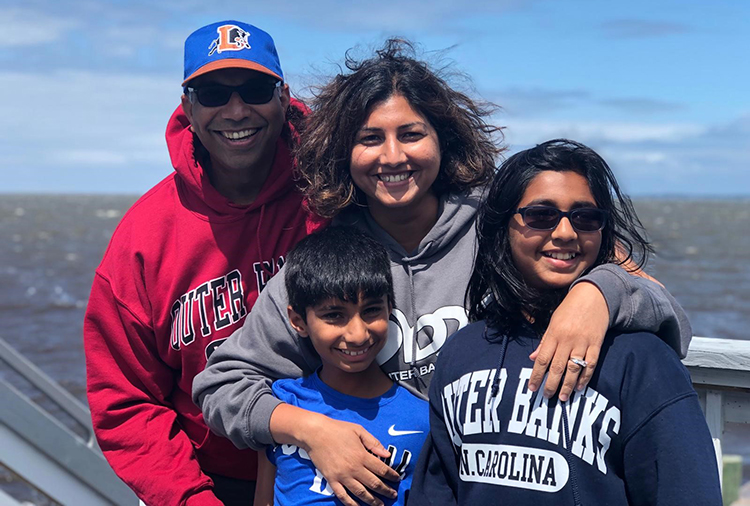
For Sameer Kamath, MD, MBBS, the call to critical care medicine came from his love of acute care and his fascination with human physiology. In this week’s Faculty Spotlight, Kamath talks about the importance teamwork and the ability to deal with any scenario at a moment’s notice. He also shares his passion for patient safety, harm prevention and quality improvement as well as some valuable advice for trainees.
How long have you been at Duke? How did you decide to come here?
I have been at Duke for 4 years. I was at University of Iowa and recruited to Duke to be the medical director of the PICU in 2015.
Reputation of the university, opportunity to contribute towards growth of the program, educational opportunities for my children, weather and proximity to family/ friends drove my decision to come to Duke.
What are your current responsibilities within the Department of Pediatrics? What does your typical day look like?
I am the medical director of the PICU and work in close partnership with my nurse manager. I have about 18 weeks of service time between the PICU and stepdown and 40 calls/year on average. My typical day on service is very busy where my team and I care for up to 16 critically ill children at a time. I am fortunate to have an outstanding team of dedicated professionals who work well together with a common goal of getting children better and keeping them safe.
When I am not on service, I am busy overseeing clinical operations of the unit and helping staff function to the top of their scope. I make it a point to visit the unit several times a day to ensure staff have what they need and to eliminate any barriers/ challenges they may be facing.
I am a member of the Pediatric Quality Review Board and chair of the Thymus Transplant Clinical Review Committee. In addition, I serve on a variety of hospital and departmental committees (e.g. Children’s Medication Safety, Children’s Core Safety and Clinical Practice Committee) that are critical to hospital and departmental operations. I love interacting with residents and fellows and contributing towards their growth as physicians.
How did you first get interested in medicine? What made you decide to pursue pediatric critical care medicine in particular?
My interest in medicine started for personal reasons. My paternal aunt developed renal failure at a very young age, and my mother was her pillar of strength. As a result, she spent a lot of time at our house, and we accompanied her to appointments all the time. While I was sad about her condition and the limits of medicine for renal failure, I was intrigued by the field of medicine. In addition, I was drawn to biology and was keen to pursue a profession that had direct application of skills learnt in training. Medicine fit the bill perfectly.
During residency, I knew I wanted to specialize in cardiology or critical care. I did not enjoy outpatient medicine, loved acute care and was fascinated by human physiology. Given these three things, the choice of Pediatric Critical Care was obvious. I enjoy the acuity and fast-paced environment and love being part of a multidisciplinary team. The wide variety of diagnoses and the ability to deal with any scenario on a moment’s notice were very appealing to me.
What’s one thing you wished more of your patients knew about critical care medicine or medicine in general?
Critical Care Medicine is a team sport. It takes many highly motivated and qualified individuals to care for a sick child. Several variables are considered when making critical decisions. Modern medicine has enabled extreme levels of support to save and sustain lives on a regular basis placing a lot of responsibility on providers to perform at a very high level continuously. I do not think people appreciate the challenges we face or the toll it takes on providers.
What are your specific interests in the field of critical care medicine? What do you enjoy most about your work?
My passion is patient safety and harm prevention. I believe in investing in systems of care and enjoy being on a journey of continuous improvement with my team. I feel humility, mutual respect and trust are essential to a high functioning team and I hope to lead by example.
Watching a very ill child get better and back to his/her full potential through outstanding teamwork gives me the most joy at work.

Is there any research or other special projects you are doing or plan on doing?
My research is focused on quality improvement. During my time here, we have worked on several quality improvement projects that have resulted in regional and national presentations. Minimizing Interruption during Handoff, Rounding Checklist, Standardizing High Flow Nasal Cannula wean in Bronchiolitis, ED to PICU handoff etc. are examples of some of the QI work we have completed. In addition, I have participated in a couple of point prevalence studies through PALISI looking at nutrition and mobilization in the PICU. We plan to work on reducing alarm fatigue, standardizing fluid management and optimizing enteral nutrition in the near future.
You completed residency training both in India and the United States--do you have any advice for our trainees?
I think our trainees should consider an elective in developing countries. Limited resources force you to be creative, innovative and sharpen your clinical skills. The fact that high quality care can be delivered in a resource limited setting is something one needs to experience firsthand.
What passions or hobbies do you have outside of work?
I love spending time with my wife and kids, cooking and listening to music. We like to travel and visit new places as a family. Cricket is my passion and I hope to play in local leagues on weekends in the future.